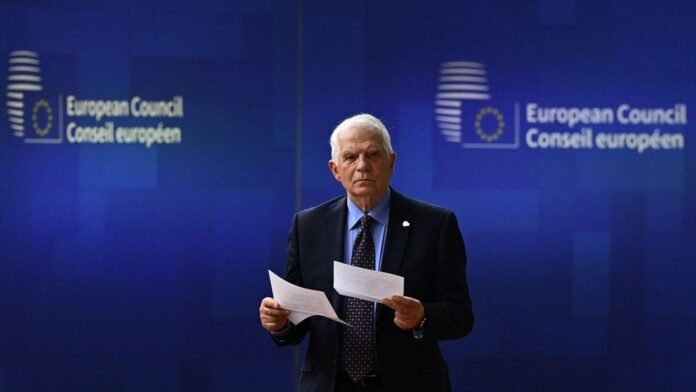Posted July 20, 2023, 6:04 p.mUpdated on July 20, 2023, at 18:54
Gathering in Brussels on Thursday for a Council of Foreign Ministers, the Twenty-Seven had an initial discussion on ways to improve their cooperation with Turkey.
The equation is not simple, while Ankara’s positioning in the war in Ukraine and Turkey’s role in circumventing sanctions against Russia have deeply irritated the Europeans.
Swedish membership of NATO
Just as a few days ago, Turkish President Recep Tayyip Erdogan linked the relaunch of Turkey’s accession negotiations to the EU with his support for Sweden’s accession to NATO.
In fact, the EU had already mentioned at the end of June the need to review its relations with Turkey, whose geostrategic position it now considers to be essential, all the more so at the time of the war in Ukraine.
During a European Council, the leaders of EU member states then called on Josep Borrell, the head of European diplomacy, to write a “strategic and forward-looking” report on the state of relations with Ankara – scheduled for the autumn.
Blackmail
The blackmailing of the Turkish president, whatever people say, has obviously accelerated things. The Twenty-seven are really determined to do more for Turkey.
It is going through a serious economic crisis and therefore it is necessary to intensify its trade with its first partner, the EU, and to attract investors.
The 27 mentioned several avenues, such as the deepening of the customs union concluded in 1995, as well as the revision of an agreement on migration.
The foreign ministers also explored ways to improve the visa regime by easing entry conditions for Turkish nationals into the EU; or to improve cooperation on energy and climate. Above all, they agreed on the need for concrete actions for Ankara on issues related to human rights and the rule of law.
EU membership
At present, there is no question of going ahead and therefore considering a restart of the negotiations on Turkey’s accession to the EU. Launched in 2005, they had been suspended since the failed coup attempt in 2016, which triggered massive purges of political opponents and journalists.
Now the Europeans intend to judge Turkey on its actions. It is up to her to prove that she has changed, otherwise the negotiations will not go very far.
The Cyprus issue
“The process remains at the bottom of the iceberg, as essential chapters of the discussions such as the rule of law and human rights have not been implemented and are far from being. We must not be naive, there will be no gifts,” warned German Minister Annalena Baerbock.
For the moment, it seems only that the Cyprus issue has developed. Cyprus intends to take advantage of renewed ties between Turkey and the EU to put back on the table the issue of Turkey’s occupation of the northern third of its territory since 1974.
“There is in the relationship with Greece the expressed willingness to find the means for a relative reconciliation in the Eastern Mediterranean. The new Cypriot president has also shown more openness towards Turkey, notes a diplomat. This does not solve the problem in northern Cyprus, but at this level there is a new atmosphere that needs to be confirmed. »
The subject will no doubt be discussed again at the Granada summit scheduled for early October, where much will be said about an enlargement of the Union.
20 billion in military aid to Ukraine
EU foreign ministers also had an exchange of views, a priori without controversy, on new military aid of 20 billion euros to Ukraine over four years aimed at providing the country with long-term security guarantees. However, some believe that part of the money can also be used to strengthen Europe’s industrial base. A more in-depth debate on this “defense fund” project is planned for the end of August during an informal meeting of the heads of EU diplomacy in Toledo (Spain). Final validation, if the Twenty-Seven agree, would not take place before the end of the year during a summit of European leaders.
